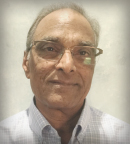I have witnessed much sickness and death over my 35-year career as a medical oncologist. During the early years of my career, I had difficulty dealing with the sickness and death I witnessed on a regular basis. As a result, with help from the Hindu scripture of Bhagavad Gita, I have trained my brain to have a certain amount of detachment when treating patients with terminal cancer, without being indifferent to their condition or compromising the quality of care I provided. So, 2 years ago, when I was diagnosed with stage IV non–small cell lung cancer (NSCLC), I didn’t feel sadness or depression; I just accepted the situation.

Radhakrishna Vemuri, MD, FACP
The diagnosis came as a surprise because, except for some minor neurologic symptoms, including subtle changes in my memory and balance, which I thought might be the result of a transient ischemic attack, I felt fine. However, the symptoms were bothersome enough for me to seek medical attention from a neurologist.
Based on the neurologic exam, the doctor ordered a brain magnetic resonance imaging (MRI), which detected multiple lesions in my brain, including two masses (more than 4 cm) in my right frontal-parietal and temporal lobes with surrounding edema. Having seen hundreds of similar images from scans of patients I’ve treated over the years, I immediately knew the significance of these lesions, but I had no emotional reaction. A computed tomography (CT) scan of my chest, abdomen, and pelvis the following day found the source of the brain lesions, a mass in the lower lobe of my left lung. A needle biopsy of the tissue confirmed it to be non–small cell lung adenocarcinoma. Genomic sequencing of the tumor determined it was positive for the EGFR mutation.
I knew that lung cancer with such extensive metastasis to my brain meant I had a probable life expectancy of between 6 and 8 months.
Experiencing Spontaneous Tumor Regression
I immediately underwent a course of whole-brain radiation, which has diminished the size and number of the lesions. I also met with a thoracic oncologist who prescribed a baseline CT scan before treating me with the third-generation EGFR tyrosine kinase inhibitor osimertinib.
A pleasant surprise on the imaging scan showed that without any prior treatment, the mass in my lung had spontaneously been reduced by 30%. This confirmed for me that there is so much we don’t know about cancer and the body’s response to it.
To date, osimertinib is keeping the cancer stable, and I feel better than I did 5 years ago.
Living a Positive Life
I am a physician and know my medical situation is precarious. I will continue treatment and look forward to hopefully years of quality life. I want to emphasize the power of positive thinking, even in the direst circumstances. I am not going to alter the inevitable, so it’s not that I’m in denial about the likely course of this cancer. I accept whatever happens. I have no control over this disease, the raging COVID-19 pandemic, or any other disaster that might be coming my way. The only control I have is my reaction to dealing with catastrophic events, and I choose to maintain an optimistic attitude. I have already exceeded my expectations for the course of my cancer.
Listening and Caring for Patients
In the March 10, 2019, issue of The ASCO Post, a commentary on the “10 Patient-Centered Principles for More Conservative Cancer Diagnosis,” caught my eye, since I have used some of them during my practice and believe they are worth repeating here. Among the principles are promoting a model for enhanced listening to and caring for patients; developing a new science to better operationalize and communicate clinical uncertainties; and rethinking symptoms and recognizing that many are unexplained, self-limited, and can benefit more from careful approaches than indiscriminate testing.
“I want to emphasize the power of positive thinking, even in the direst circumstances. I am not going to alter the inevitable; I accept whatever happens.”— Radhakrishna Vemuri, MD, FACP
Tweet this quote
These principles resonate with me both as a physician and as a patient. We always have to remember that every patient is an individual, and we cannot assume his or her cancer will follow a typical path. We have to support patients, and, most important, we have to listen to them about their survivorship goals.
Despite having stage IV NSCLC, I haven’t slowed down. Although now in retirement, I continue to offer medical consultations and maintain an active lifestyle by playing golf and tennis. I am also working on a book about redefining hope at every stage of cancer. My life is as busy as it was during my career, and I love it.
I can actually say with sincerity that having cancer has changed my life for the better.
Dr. Vemuri lives in Greensboro, Georgia.
Editor’s Note: Columns in the Patient’s Corner are based solely on information The ASCO Post received from patients and should be considered anecdotal.

